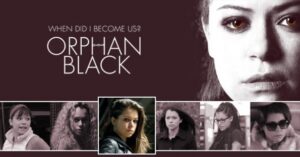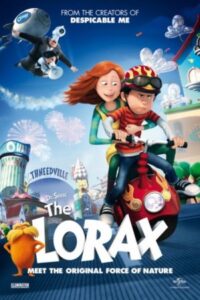
Tatiana Maslany as Alison, Helena, Sarah, Beth, Cosima, and Katja.
Orphan Black is a new science fiction television show produced by BBC America and Space, starring Canadian actress Tatiana Maslany. I recently discovered this series, the first season of which just finished airing in the beginning of June 2013, and I plowed through all 10 episodes in two days. It's a smart, complex, often dark yet at times quite funny, and well-paced show with a continuous narrative arc that explores the issues of identity and intellectual property. There is fine acting all around but the two standouts are Tatiana Maslany, who plays many roles on the show for which she deservedly won a Critics' Choice Television Award for Best Actress in a Drama Series, and Jordan Gavaris, who plays the foster brother of one of Maslany's characters.
Minor spoilers follow, but everything I mention is revealed in the first episode or featured prominently in the official publicity for the show.
The science fiction element of the show is pretty low key. You won't see much in the way of futuristic technology in this series. Instead, the plot revolves around the controversial subject of human cloning and the early stages of body modification and genetic engineering. Who are we if we are not biologically unique, if there are others out there who are genetically identical to us? How much would our experiences and personal choices shape who we become despite this? What would you do if you encountered to your surprise not one but two or three or more other people who look exactly like you? What is it that makes us human? These are some of the questions explored in Orphan Black.
The series begins by introducing us to the main character of the show, Sarah Manning, played by Maslany. Sarah is an orphan, born in Great Britain, raised by a foster mother, and moved to Canada at an early age. Now a young woman, we meet her trying to escape a wild life of crime, drugs, and an abusive boyfriend. Sarah aims to get her life back together, reclaim custody of her daughter Kira from her foster mother Mrs. S, and scrounge up enough money to make a new life somewhere for herself, her daughter, and her foster brother Felix (played by Gavaris).
[continue reading…]
Help Promote Prometheus Unbound by Sharing this Post

Anyone who read Dr. Seuss's The Lorax as a kid might dread the movie version. No one really needs another moralizing, hectoring lecture from environmentalists on the need to save the trees from extinction, especially since that once-fashionable cause seems ridiculously overwrought today. There is no shortage of trees and this is due not to nationalization so much as the privatization and cultivation of forest land.
And yet, even so, the movie is stunning and beautiful in every way, with a message that taps into something important, something with economic and political relevance for us today. In fact, the movie improves on the book with the important addition of “Thneed-Ville,” a community of people who live in a completely artificial world lorded over by a mayor who also owns the monopoly on oxygen.
This complicates the relatively simple narrative of the book, which offers a story of a depleted environment that doesn't actually make much sense. The original posits an entrepreneur who discovers that he can make a “Thneed” — a kind of all-purpose cloth — out of the tufts of the “Truffula Tree,” and that this product is highly marketable.
Now, in real life, any capitalist in this setting would know exactly what to do: immediately get to work planting and cultivating more Truffula trees. This is essential capital that makes the business possible and sustainable through time. You want more rather than less capital. An egg producer doesn't kill his chickens; he breeds more. But in the book (and the movie), the capitalist does the opposite. He cuts down all the trees and, surprise, his business goes bust.
The book ends with the aging capitalist regretting his life and passing on the last Truffula seed to the next generation. The end. However, the movie introduces us to the town that is founded after this depletion occurs. It is shielded off from the poisoned and depleted world outside, and oxygen is pumped in by the mayor who holds the monopoly on air and builds Lenin-like statues to himself. The people eventually rise up when they discover that “air is free” and thereby overthrow the despot, chopping off the statue's head.
It was this line about how air is free that clued me in to the movie's possible subtext. You only need to add one metaphor to see how this movie can be the most important and relevant political-economic drama of the season.
The metaphorical substitution is this: The Trees are Ideas.
[continue reading…]
Help Promote Prometheus Unbound by Sharing this Post



